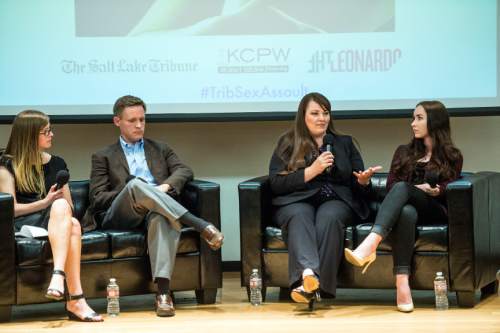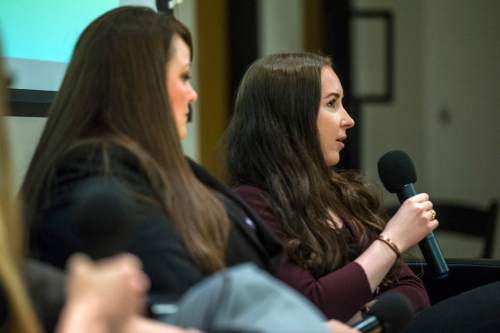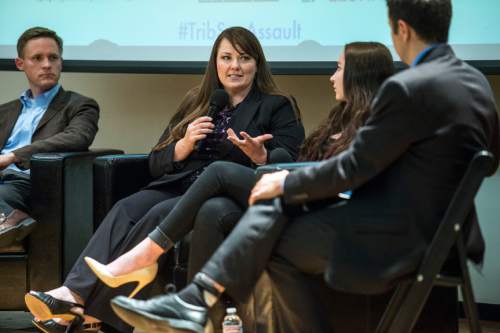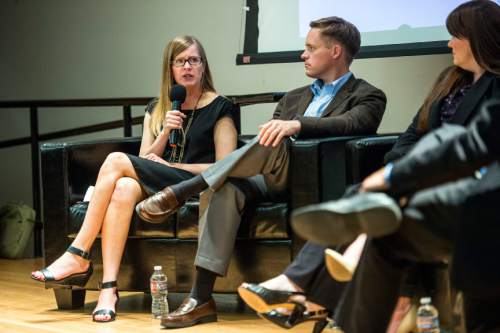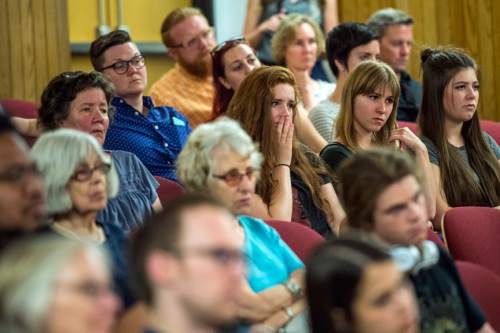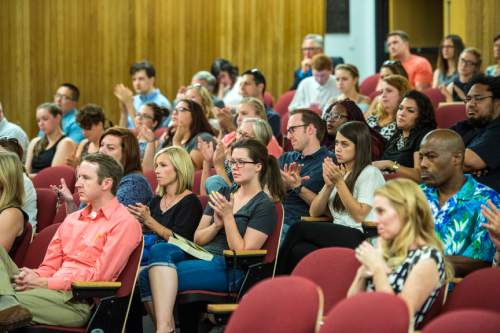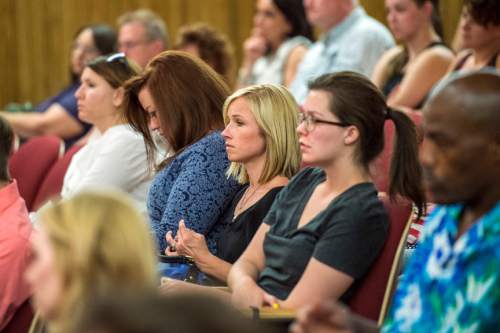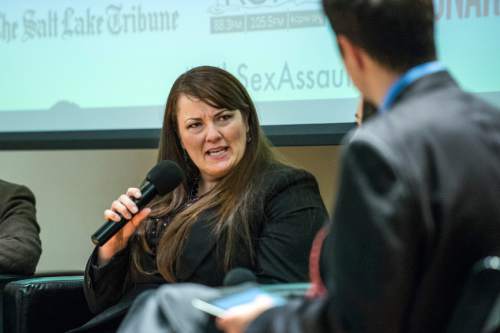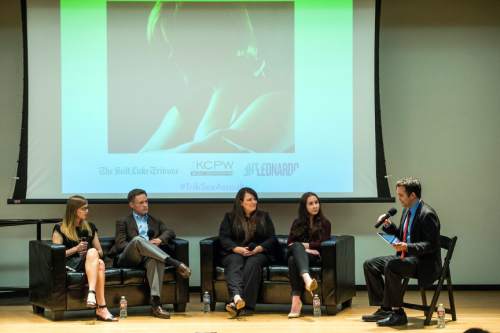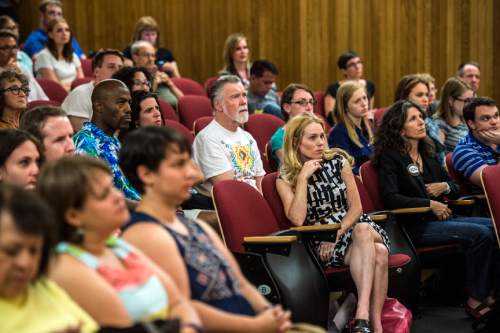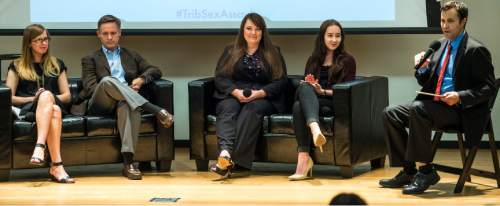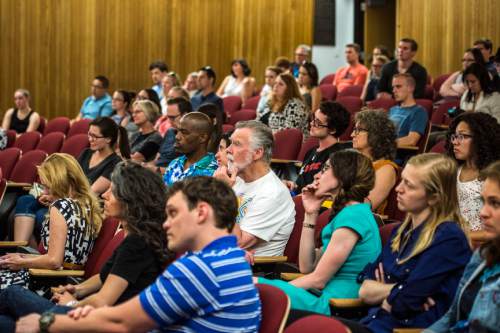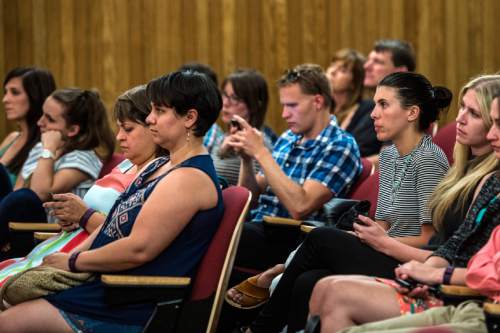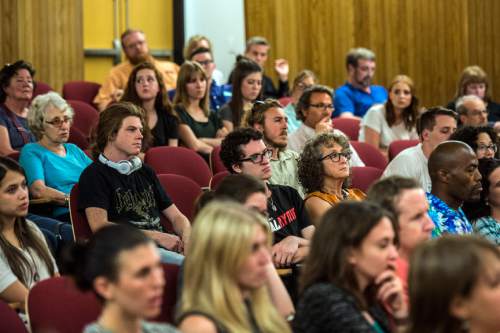This is an archived article that was published on sltrib.com in 2016, and information in the article may be outdated. It is provided only for personal research purposes and may not be reprinted.
There are many myths about rape: that a rapist is a stranger who jumps out of bushes.
That a victim will be better after crying in her room for a weekend.
That if a woman dressed differently or acted differently, it wouldn't have happened to her.
A panel of experts tried to dispel these myths and others during a Salt Lake Tribune town hall discussion Thursday while exploring what Utah colleges are doing to understand, prevent and respond to sexual assaults.
Jodi Petersen, a panelist who is a sexual-assault support advocate with the University of Utah's Center for Student Wellness, said during Thursday's town hall that these myths often stop victims from reporting that they were sexually assaulted. Victims also may hesitate because they fear they won't be believed, Petersen said, or they are worried about what might happen to the person who raped them.
"We, as young women, are taught how to protect ourselves from being raped," she said. "[But] it's the bogeyman. It's not the cute guy from chem class."
People often seek answers about sex or sexual consent, Petersen said, from friends who are just as sexually inexperienced as they are, or from the internet — neither of which provides healthy results.
"I think our [Utah's] lack of sexual education is a big part of what we have problems with consent," she said.
Panelist Madi Barney, who filed a federal complaint against Brigham Young University because she says the school blocked her from enrolling in classes after she reported to local police that she'd been raped, said she has had inappropriate questions asked of her since she reported her rape. She was asked what she was wearing, or told that if she followed BYU's Honor Code, her assault could have been prevented.
"The Honor Code is not a magic wand that you can wave and everybody is safe," she said Thursday. "What causes rape is the rapist."
Other panelists at Thursday's event, held at the Leonardo in Salt Lake City, were Steve Evans, attorney and co-founder of the Mormon blog "By Common Consent"; and Tribune reporter Erin Alberty. KCPW's Roger McDonough moderated the discussion.
In Utah, women who have reported sexual assaults at the University of Utah and Utah State University have said the schools take too long to investigate and resolve discipline cases, leaving them struggling to maintain normal college lives.
And Westminster College is under investigation by the U.S. Education Department's Office for Civil Rights, which is determining whether the private Salt Lake City school complied with federal regulations when a student reported a sexual assault in 2013.
Students at BYU, which is owned by The Church of Jesus Christ of Latter-day Saints, have criticized the school's handling of sexual-assault cases, saying they faced discipline under the Honor Code after reporting they had been raped. As part of its study of possible improvements, BYU launched a website — feedback2016.byu.edu — to receive comments on its handling of sexual-assault reports. Its advisory council also is reviewing comments on a petition protesters delivered to the school during a rally in April. Barney created the petition earlier that month.
Julie Valentine, a sexual-assault nurse examiner and a member of BYU's Advisory Council on Campus Response to Sexual Assault, originally was part of The Tribune's panel, but she declined to participate in person after Barney was added to the panel last week. She said in a video interview, played during the town hall, that the council is working in numerous ways to study the issue of sexual assault, including speaking with victims and examining the relationship between the Honor Code Office and the school's Title IX Office. She said 3,600 comments have been left at BYU's website — comments that have been helpful to the advisory council as it contemplates which changes to make at the university.
"Sexual assault is throughout our community," she said. "The only way we are going to change is by having multiple voices."
Twitter: @jm_miller


